Secret Service Interviewed Aaron Swartz's Friends About Guerilla Open Access Manifesto
from the because-that-must-be-evil,-right? dept
For a while it has been stated, without direct evidence, that part of the reason why the feds were so focused on Aaron Swartz was because of the now infamous Guerilla Open Access Manifesto, which Aaron Swartz had posted online years ago (there is some question as to whether Aaron wrote the whole thing himself, or co-authored it with others...). The feds seemed to take that as some sort of proof that Swartz was downloading JSTOR articles to release them for free online, though one would hope they had a lot more evidence than a random internet rant from many years ago. Either way, as part of Kevin Poulsen's FOIA request for the Secret Service files on Aaron Swartz -- files that are being fought over in court -- the first 100 pages have been released, with another 14,400 or so to go.There really isn't that much interesting in the documents, as they mostly focus on items seized via search warrants. However, there are two interesting tidbits, both highlighted by Poulsen in his article. The first is more evidence that the feds really did think that the Open Access Manifesto was a key bit of evidence in the case. The documents (towards the very end) include very heavily redacted passages from interviews done by the Secret Service and Cambridge police of at least two individuals, and in both cases there are questions asked (and answered) about the manifesto. In one, a woman notes that Swartz had started a Google Group called Guerilla Open Access. For what it's worth, this Google Group used to exist over here, but disappeared a long time ago. Another interview involves a male friend of Swartz, who was asked about the manifesto and said he read it and became interested in the ideas in it, though he never spoke to Swartz about whether or not Swartz actually wrote it. The friend did tell the Secret Service that "They believe that the open access movement is a human rights issue."
Of course, it's hard to see how the open access movement isn't a human rights issue in many ways, though that doesn't automatically mean that everyone supports copying and releasing all works.
The other interesting thing in the document concerns when the search warrant was finally executed for Swartz's apartment. As had been noted earlier, for reasons that still are murky, the search warrant wasn't executed until about a month after Swartz was arrested, and many people have questioned the timing on that. The report notes that Swartz himself seemed reasonably annoyed that his home was searched and items seized a month after the whole thing happened.
Swartz was home at the time the search was executed. While the search was conducted, Swartz made statements to the effect of, what took you so long, and why didn't you do this earlier?The report also mentions that the agents saw Swartz walk out to the street and then "sprint away," later catching up to him at his office at Harvard. There's really not that much detail here, but interesting to see that the feds really did seem so focused on the manifesto. I'm sure there will be other interesting findings if the other documents are released -- and not completely redacted. It really does seem bizarre to have so many redactions, given that the case is now completely over.
Filed Under: aaron swartz, guerilla open access manifesto, open access, secret service


